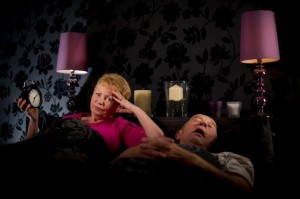 We’ve all used the expression, “Don’t lose any sleep over it.” Turns out that losing sleep is one thing that can happen a lot more frequently as we age and it often is associated with other serious medical conditions. The common causes of older adult insomnia are dementia, heart disease, kidney disease, heartburn or reflux, asthma, diabetes, thyroid disease or even prostate issues. So if you are a caregiver to an older adult who has been having trouble sleeping, it is worth paying attention.
We’ve all used the expression, “Don’t lose any sleep over it.” Turns out that losing sleep is one thing that can happen a lot more frequently as we age and it often is associated with other serious medical conditions. The common causes of older adult insomnia are dementia, heart disease, kidney disease, heartburn or reflux, asthma, diabetes, thyroid disease or even prostate issues. So if you are a caregiver to an older adult who has been having trouble sleeping, it is worth paying attention.
And at the same time, insomnia is not always just one kind of condition. Some older adults have trouble falling asleep initially and some have trouble staying asleep. Some insomniacs may wake up several times a night, perhaps because they need to make trips to the bathroom, and some just cannot seem to feel rested in the mornings because they do not get a quality night’s sleep.
As we grow older we need less sleep than we did as children or teenagers. Although we as a nation seem to deprive ourselves of sleep by getting up early, staying up late or both, the average adult needs about seven to eight hours of sleep a night to function well. People who say they need less may just have grown accustomed to getting by with less sleep, but they may also have a difficult time focusing during the day or may be cranky or irritable.
Sometimes it may simply be consuming caffeine, nicotine or alcohol, or it can be nutritional supplements or even vigorous exercise too close to bedtime that get in the way of good night’s sleep. If you know someone who has trouble getting enough quality sleep, here are some tips that may help without resorting to the pharmaceutical sleep aids we have seen advertised a lot:
1. It may be the afternoon nap that has to be taken out of the day’s schedule in order to feel sufficiently tired to sleep at night…or the dozing off in front of the television after supper.
2. Make sure the bedroom is dark enough and quiet enough, and move the clock out of sight so that there is not the temptation to keep checking what time it is.
3. Don’t use the bed as place where you eat, watch television or read so much that it is no longer that restful haven at the end of a day.
4. Try to go to bed at the same time every night, and have some real physical activity each day so that the body will have something from which to be tired.
5. Encourage your older adult to make a written list of the things they will do the next day so that the mind does not get caught up in the mental list-making that keeps the body awake.
6. Above all, relax before bed time; it can be helpful to have a calming time that helps to really separate the day’s activities from the night’s surrender to sleep.
Charlotte Bishop is a Geriatric Care Manager and founder of Creative Case Management, certified professionals who are geriatric advocates, resources, counselors and friends to older adults and their families in metropolitan Chicago. Please email your questions to ccbishop@creativecasemanagement.com.



